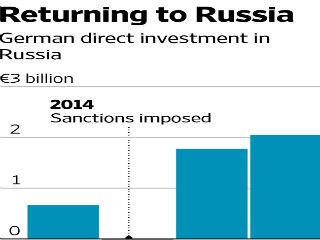by
N. Peter Kramer
Plunging oil prices and US/EU sanctions sent foreign investors fleeing from Russia. Now, it looks that Western firms are placing new bets that the country is on the verge of an upswing.
As in the past, German companies are showing the way. ‘Businesses ranging from blue chips such as Daimler AG, Volkswagen AG and Henkel AG, to lesser-known niche players are embarking on new investments in Russia’, according to the WSJ. The world’s leading financial newspaper points to German companies doing business in Russia since the czarist era. Some bonds have indeed been strained amid a frosty relationship between German Bundeskanzlerin Angela Merkel and Russian President Vladimir Putin, but few were severed. Siemens AG CEO Joe Käser visited Putin in 2014 at the beginning of the Ukraine crisis, sparking outrage in Berlin.
Conditions for doing business in Russia are improving, access to financing remains tough. Despite these concerns car maker Daimler is in talks with the Russian government about building a factory. Volkswagen started in November production of its Tiguan compact sport-utility vehicle in Kaluga, south-west of Moscow. It invested €1.2 billion in modernising this plant. Henkel, industrial and consumer staples, opened this summer a new €30 million detergent plant in Perm. Siemens, which had to pare back its business in Russia to comply with the EU sanctions, said last month that it would re-engage with Russia if the political skies cleared.
But it is not just German firms returning to Russia, although Germany is the second-biggest investor in Russia this year, behind China with investments in 35 new projects. The Russian government is offering foreign firms that sign a ‘Special Investment Contract’ which includes a pledge to invest in the country, the same status as domestic producers, making them eligible to apply for state contracts and special tax benefits.
Other interesting news last week was, that Glencore bolstered its ties to Russia. It took a stake in Russian oil producer Rosneft, a victory for the Swiss commodity trader in a market it once dominated. The deal for a small stake in Rosneft comes after Glencore’s position in Russia slipped in recent years. Glencore has also close ties with Russian aluminium makers and agricultural firms.






